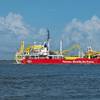As a part of an ongoing portfolio restructuring exercise following booking of losses for three years in a row, Mercator Limited has decided to exit dry bulk business carried on by its arm Mercator Lines(Singapore) Ltd(MLS).
Mercator has 11 bulkers in its fleet, ranging between 70,000 and 92,50 dwt built from 2001 to 2010.
The Board of Directors of the company in a meeting have approved to stake sale proposal and a sole placement agreement has been appointed to identify the prospective investor/buyer for the sale of entire stake in Singapore Stock Exchange listed MLS.
The bulk carriers business has been the worst affected by the downturn in the shipping cycle with the Baltic Dry Freight having collapsed from a level of 11,793 in 2008 to 373 on January 15, 2016 and not showing signs of early revival in future.
Mercator said MLS made a net loss of $126m in 2015, and has debts of $164m.
The loss Singapore company has been under pressure from its creditors, including HSH Nordbank which been attempting to have the company placed under judicial management. Attempts by MLS to agree a financial restructuring have been unsuccessful.
The losses have been reported as dry bulk carriers experience the worst downturn in the shipping cycle and amid a continuing decline of the Baltic Dry Freight index that has plunged below 400 points, now standing at 373 points.
Except for dry bulk, all other operating businesses of Mercator India, as well as its subsidiaries, i.e. dredging, tankers, coal and logistics and oil & gas are performing satisfactorily.
In the annual report 2014-15, Chairman of the group H K Mittal had observed that dry bulk segment continues to face challenges due to the oversupply that is persisting for the past years.
The dry bulk shipping market will remain in recession due to contracting demand for iron ore and coal, and any recovery is not expected until 2017, according to the Dry Bulk Forecaster report published by global shipping consultancy Drewry in September.










